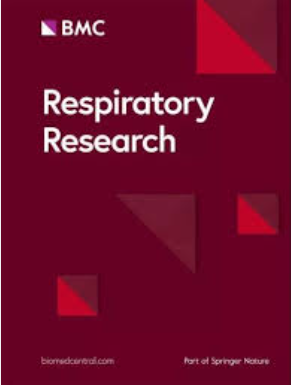An algorithm for discontinuing mechanical ventilation in boys with x-linked myotubular myopathy after positive response to gene therapy: the ASPIRO experience
IF 4.7
2区 医学
Q1 RESPIRATORY SYSTEM
引用次数: 0
Abstract
X-linked myotubular myopathy (XLMTM) is a rare, life-threatening congenital myopathy. Most (80%) children with XLMTM have profound muscle weakness and hypotonia at birth resulting in severe respiratory insufficiency, the inability to sit up, stand or walk, and early mortality. At birth, 85–90% of children with XLMTM require mechanical ventilation, with more than half requiring invasive ventilator support. Historically, ventilator-dependent children with neuromuscular-derived respiratory failure of this degree and nature, static or progressive, are not expected to achieve complete independence from mechanical ventilator support. In the ASPIRO clinical trial (NCT03199469), participants receiving a single intravenous dose of an investigational gene therapy (resamirigene bilparvovec) started showing significant improvements in daily hours of ventilation support compared with controls by 24 weeks post-dosing, and 16 of 24 dosed participants achieved ventilator independence between 14 and 97 weeks after dosing. At the time, there was no precedent or published guidance for weaning chronically ventilated children with congenital neuromuscular diseases off mechanical ventilation. When the first ASPIRO participants started showing dramatically improved respiratory function, the investigators initiated efforts to safely wean them off ventilator support, in parallel with primary protocol respiratory outcome measures. A group of experts in respiratory care and physiology and management of children with XLMTM developed an algorithm to safely wean children in the ASPIRO trial off mechanical ventilation as their respiratory muscle strength increased. The algorithm developed for this trial provides recommendations for assessing weaning readiness, a stepwise approach to weaning, and monitoring of children during and after the weaning process.基因疗法阳性反应后停止X连锁肌管型肌病男孩机械通气的算法:ASPIRO的经验
X 连锁肌小管肌病(XLMTM)是一种罕见的、危及生命的先天性肌病。大多数(80%)XLMTM 患儿在出生时会出现严重的肌无力和肌张力低下,导致严重的呼吸功能不全,无法坐起、站立或行走,并很早就死亡。出生时,85-90% 的 XLMTM 患儿需要机械通气,其中一半以上需要有创呼吸机支持。一直以来,对于这种程度和性质的神经肌肉源性呼吸衰竭患儿,无论是静态的还是进行性的,都无法完全脱离机械呼吸机的支持。在 ASPIRO 临床试验(NCT03199469)中,与对照组相比,单次静脉注射研究基因疗法(resamirigene bilparvovec)的参与者在用药后 24 周内的每日通气支持时间开始出现显著改善,24 名用药参与者中有 16 人在用药后 14 到 97 周内实现了独立使用呼吸机。当时,对于患有先天性神经肌肉疾病的长期通气患儿,还没有断开机械通气的先例或公开指南。当第一批 ASPIRO 参与者的呼吸功能开始显著改善时,研究人员开始努力让他们安全地脱离呼吸机支持,同时进行主要方案的呼吸结果测量。一组呼吸护理、生理学和 XLMTM 患儿管理方面的专家制定了一种算法,随着 ASPIRO 试验中患儿呼吸肌力量的增强,让他们安全脱离机械通气。为该试验开发的算法提供了评估断奶准备情况、逐步断奶以及在断奶过程中和断奶后监测患儿的建议。
本文章由计算机程序翻译,如有差异,请以英文原文为准。
求助全文
约1分钟内获得全文
求助全文
来源期刊

Respiratory Research
医学-呼吸系统
自引率
1.70%
发文量
314
期刊介绍:
Respiratory Research publishes high-quality clinical and basic research, review and commentary articles on all aspects of respiratory medicine and related diseases.
As the leading fully open access journal in the field, Respiratory Research provides an essential resource for pulmonologists, allergists, immunologists and other physicians, researchers, healthcare workers and medical students with worldwide dissemination of articles resulting in high visibility and generating international discussion.
Topics of specific interest include asthma, chronic obstructive pulmonary disease, cystic fibrosis, genetics, infectious diseases, interstitial lung diseases, lung development, lung tumors, occupational and environmental factors, pulmonary circulation, pulmonary pharmacology and therapeutics, respiratory immunology, respiratory physiology, and sleep-related respiratory problems.
 求助内容:
求助内容: 应助结果提醒方式:
应助结果提醒方式:


